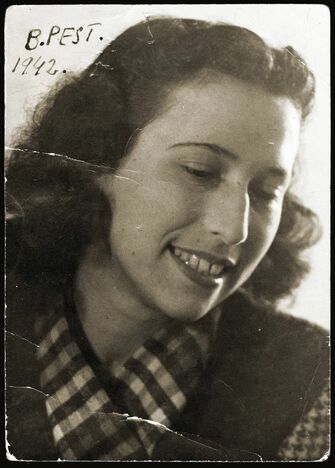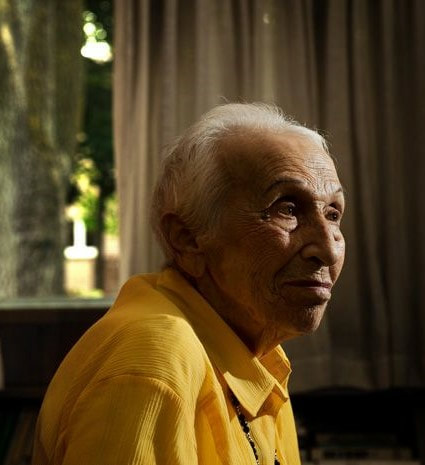There are many similarities in the experiences of Jewish men and women forced to endure concentration camp existence during the Holocaust. All experienced or witnessed dehumanization and abuse, slave labor and starvation, obedience and resistance, isolation and moments of forbidden intimacy. All could be beaten or raped or murdered at any given moment.
But only women could become pregnant. And the punishment for a pregnant Jewish woman prisoner in the camps was death (Harrison).
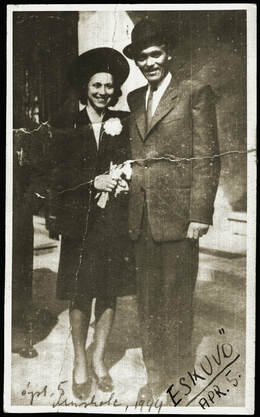 Miriam and Bela Rosenthal
Wedding Photo
Miriam and Bela Rosenthal
Wedding Photo
Holocaust survivor Miriam Schwarcz (1922-2018) experienced the danger for a pregnant Jewish woman firsthand in 1945. Less than a year after her marriage to Bela Rosenthal and their honeymoon in 1944, he was taken for slave labor and she was deported to Auschwitz. Luckily, she was then taken to Germany for factory work. Unluckily, she also discovered at this time that she was pregnant.
Soon, Miriam faced a quandary. SS officers commanded all pregnant women workers to step forward. Because they threatened to kill the co-workers of anyone who disobeyed and was discovered to be pregnant, Miriam stepped up. She was immediately sent back to Auschwitz. The only reason she and her unborn baby were not killed upon arrival was that the crematoria had been shut down.
The stakes were raised again when this command was next given in Auschwitz. Miriam was four months pregnant and starving, and the officers promised double rations for those who stepped forward. 200 women did (including some who were not even pregnant), but Miriam held back. All 200 were killed (O'Connor).
Soon, Miriam faced a quandary. SS officers commanded all pregnant women workers to step forward. Because they threatened to kill the co-workers of anyone who disobeyed and was discovered to be pregnant, Miriam stepped up. She was immediately sent back to Auschwitz. The only reason she and her unborn baby were not killed upon arrival was that the crematoria had been shut down.
The stakes were raised again when this command was next given in Auschwitz. Miriam was four months pregnant and starving, and the officers promised double rations for those who stepped forward. 200 women did (including some who were not even pregnant), but Miriam held back. All 200 were killed (O'Connor).
Although 200 is a large number, the reason the numbers in the camps were not larger is in part because pregnancy was "forbidden" among Jewish women even before deportation to the camps. In the Kovno Ghetto in 1942, for example, the Gestapo demanded the termination of every pregnancy, and visibly pregnant women were put to death (Harrison).
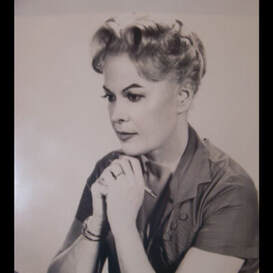 Olga Lengyel
Olga Lengyel
Moreover, not all pregnant women in the camps died. Some miscarried due to starvation and stress. Others found the means for abortion. And some gave birth but had to allow the infant to be killed in order for their own survival. Auschwitz survivor Olga Lengyel tells in her Holocaust memoir Five Chimneys how she was made a "nurse" in the camp infirmary. She was given no equipment, drugs, or even a clean environment. When faced with a woman in labor, she had to secretly help deliver the newborn, but it could not be allowed to live. She would suffocate it and declare it to have been a stillborn. Only this gave the mother hope of survival. After giving birth, the woman would return to her barracks alone and, with much luck, survive. With no truly humane choices available, Olga did the best she could, knowing that her actions could get her killed.
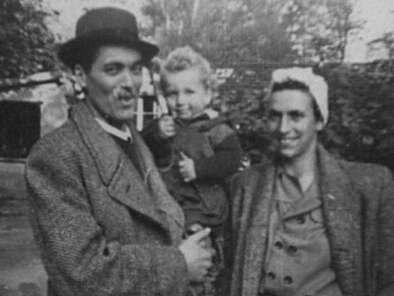 Miriam and Bela Rosenthal with Leslie
Miriam and Bela Rosenthal with Leslie
As for Miriam, she was moved to Kaufering I, a satellite camp near Dachau, after having a number tattooed on her arm. To her great surprise, she was taken into a barren basement where six other pregnant women resided.
A female Jewish Kapo (overseer) smuggled a stove into the room to keep the women from freezing during the winter of 1945. When the stove was discovered by camp authorities, it was removed, but the women were not. And the Kapo brought the stove back the next day. The risks this one woman took for the seven pregnant prisoners helped save their lives and that of their children (O'Connor).
All seven women gave birth in the basement, including Miriam. She named her "miracle baby" Leslie. He was the last of the seven to be born, one of the very youngest Holocaust survivors today.
In 2012, Miriam gave an interview stating that one of her most precious moments in life was seeing her husband Bela embrace his child for the first time (O'Connor).
The little family emigrated to Canada, and Miriam lived to the age of 95. At her 2018 funeral, Leslie (aged 72 at the time) said of his mother, "Her victory over the Nazis...was bringing life to this world at a time when millions of children and babies were being killed" (Ha).
A female Jewish Kapo (overseer) smuggled a stove into the room to keep the women from freezing during the winter of 1945. When the stove was discovered by camp authorities, it was removed, but the women were not. And the Kapo brought the stove back the next day. The risks this one woman took for the seven pregnant prisoners helped save their lives and that of their children (O'Connor).
All seven women gave birth in the basement, including Miriam. She named her "miracle baby" Leslie. He was the last of the seven to be born, one of the very youngest Holocaust survivors today.
In 2012, Miriam gave an interview stating that one of her most precious moments in life was seeing her husband Bela embrace his child for the first time (O'Connor).
The little family emigrated to Canada, and Miriam lived to the age of 95. At her 2018 funeral, Leslie (aged 72 at the time) said of his mother, "Her victory over the Nazis...was bringing life to this world at a time when millions of children and babies were being killed" (Ha).
As we consider Miriam's story, we learn about the many forms that resistance can take. When a Jewish woman during the Holocaust attempted to keep her pregnancy, she should be understood as rebelling against the Nazi "Final Solution," fighting against the destruction of the Jews.
Works cited
Harrison, Jonathan. “‘Pregnant Women Will Be Put to Death’: Policies on Childbirth.” Holocaust Controversies, 22 Dec. 2012, holocaustcontroversies.blogspot.com/2012/12/pregnant-women-will-be-put-to-death.html. Accessed 21 Apr. 2019.
Ha, Tu Thanh. “Obituary: Jewish Prisoner Miriam Rosenthal Gave Birth in a Nazi Camp.” The Globe and Mail, 22 Feb. 2018, www.theglobeandmail.com/news/national/jewish-prisoner-miriam-rosenthal-gave-birth-in-a-nazi-camp/article38074290/. Accessed 14 Apr. 2019.
Lengyel, Olga. Five Chimneys. NY: Howard Fertig, 1983.
O’Connor, Joe. “Pregnant in Auschwitz: Toronto Holocaust Survivor Recalls Split-second Decision that Saved Her and Unborn Son.” National Post, 25 Aug. 2012, nationalpost.com/news/canada/pregnant-in-auschwitz-toronto-holocaust-survivor-recalls-split-second-decision-that-saved-her-and-unborn-son. Accessed 14 Apr. 2019.
Ha, Tu Thanh. “Obituary: Jewish Prisoner Miriam Rosenthal Gave Birth in a Nazi Camp.” The Globe and Mail, 22 Feb. 2018, www.theglobeandmail.com/news/national/jewish-prisoner-miriam-rosenthal-gave-birth-in-a-nazi-camp/article38074290/. Accessed 14 Apr. 2019.
Lengyel, Olga. Five Chimneys. NY: Howard Fertig, 1983.
O’Connor, Joe. “Pregnant in Auschwitz: Toronto Holocaust Survivor Recalls Split-second Decision that Saved Her and Unborn Son.” National Post, 25 Aug. 2012, nationalpost.com/news/canada/pregnant-in-auschwitz-toronto-holocaust-survivor-recalls-split-second-decision-that-saved-her-and-unborn-son. Accessed 14 Apr. 2019.
